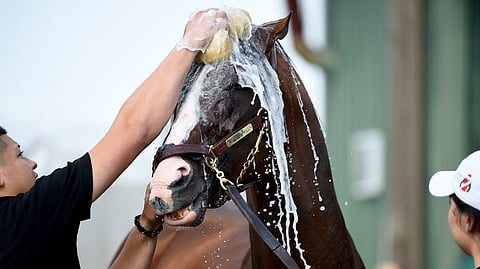Handicapping the Preakness, Part 2: Is it time to re-think a long-held theory of Kentucky Derby horses coming to Pimlico?
It was May 19, 2000 -- we remember it like it was yesterday -- and we were, as was our wont at the time, spending a quality Friday evening at the happiest place on earth: Hollywood Park. On the apron in front of the finish line, we were holding court -- OK, we were standing around and drinking beer with a group of fellow degenerates -- when a friend, who had never been to the track before, said something that we thought was blasphemy: "I think Red Bullet is going to win the Preakness tomorrow!"
We probably did not throw our beer in the air and make a scene, but now, nearly twenty years on, we almost wish that we had. We do remember very vividly that we told our friend that she had no idea what she was talking about, that Fusaichi Pegasus was an absolute cinch, that he was very nearly the perfect Thoroughbred, and that he would have to fall down to lose the Preakness the following day.
Fusaichi Pegasus did not fall down the next day, but he did lose: he struggled in the slop and finished a no-hope second, nearly seven lengths behind Red Bullet.
Red Bullet notwithstanding, however, one of the most reliable angles anywhere in horse racing for the past generation or so has been that when handicapping the Preakness, one can reliably throw out the horses who did not run in the Kentucky Derby. Since 2000, only three horses won the Preakness without running in the Derby: Bernardini in 2006, Rachel Alexandra in 2009, and Cloud Computing in 2017. We would put asterisks next to two of these: Bernardini won the year that Barbaro broke down; and while Rachel Alexandra did not run in the 2009 Derby, she did win the Kentucky Oaks, by 20 lengths, the day before. That leaves Cloud Computing as the sole "fresh shooter" winner in the past 20 or so years.
Throwing out the fresh shooters has been one of the most reliable, and enjoyable, angles in all of racing. Yet we feel as though this might be changing: While it used to be nearly automatic that the top half-dozen or so Derby finishers would run in Baltimore, the reluctance of trainers to wheel their horses back in only two weeks is dramatically affecting the composition of the Preakness. While there are five entrants this year who ran in the Derby, three of them are no-hope longshots: The only true contenders coming from Louisville are War of Will and morning-line favorite Improbable. None of the top contenders, especially Maximum Security and Country House, are here, and that makes the second jewel of the Triple Crown a much, much different deal than it would be had they been here.
Will we be tossing the fresh shooters again this year? Or will we do the opposite, and toss the Derby horses in favor of the fresh shooters? Stay tuned: In our next post, we'll look at the horses in the race individually, and see whether a start in the Derby is still a near-automatic qualification to win the Preakness, or whether the sea change in how horses are trained requires a reexamination of a fundamental precept. We'll take a closer look at this in the next chapter of our series on handicapping the Preakness.

